一、预备知识
node, npm, react, redux, es6, webpack
二、学习资源
Redux 入门教程 redux middleware 详解 Redux研究
三、工程搭建
之前有写过 webpack+react+es6开发模式 ,文章里介绍了一些简单的配置,欢迎访问。
1.可以npm init, 创建一个新的工程。创建package.json文件,定义需要的dependency,scripts,version等等。
2.新增webpack.config.json文件,定义插件项配置,页面入口文件,文件输出,加载器的配置,其他解决方案配置等。下面提供了简单配置的demo,更详细的讲解,请参考 webpack 入门指南: w2bc.com/Article/50764。

var webpack = require('webpack'); var commonsPlugin = new webpack.optimize.CommonsChunkPlugin('common.js'); module.exports = { //插件项 plugins: [commonsPlugin], //页面入口文件配置 entry: { bundle: './index.js' }, //入口文件输出配置 output: { path: './build/', filename: '[name].js' }, module: { //加载器配置 loaders: [ { test: /.css$/, loader: 'style-loader!css-loader' }, { test: /.js$/, loader: 'jsx-loader?harmony' }, { test: /.scss$/, loader: 'style!css!sass?sourceMap'}, { test: /.(png|jpg)$/, loader: 'url-loader?limit=8192'} ] }, //其它解决方案配置 resolve: { root: '******', //绝对路径 extensions: ['', '.js', '.json', '.scss'], alias: { AppStore : 'js/stores/AppStores.js', ActionType : 'js/actions/ActionType.js', AppAction : 'js/actions/AppAction.js' } } };
3.编写如果文件 main.js。这里创建了provider,store,history,router。实现页面的路由以及react组件以及组件间的state交互。关于react-redux内容请参考 react-redux概念理解,关于react-router内容请参考 React Router 使用教程 。

var React = require('react'); var ReactDOM = require('react-dom'); var { Provider } = require('react-redux'); import { Router } from 'react-router'; import routes from 'routes'; import { createHashHistory, useBasename } from 'history'; import { syncReduxAndRouter } from 'redux-simple-router'; import { routeReducer } from 'redux-simple-router'; var configureStore = require('./stores/configureStore'); // Run our app under the /base URL. const history = useBasename(createHashHistory)({ basename: '/', }); const store = configureStore(window.__INITIAL_STATE__); syncReduxAndRouter(history, store); ReactDOM.render ( <Provider store={store}> <Router history={history}> {routes} </Router> </Provider>, document.getElementById('root') );
4.创建工程的各个模块
|--demo1
|--src //源码
|--actions // 存放当前触发Redux的动作行为
|--components // 存放工程内部的公共组件
|--modules // 存放工程各模块代码
|--constants // action动作常量
|--reducers // 存放reducer函数,用来修改store状态
|--routes // 放置页面路由 react router
|--stores // 放置stores配置文件
|--main.js // 入口js
|--index.html // 工程入口文件html
|--node_modules // 存放依赖的第三方模块库,使用命令 npm install
|--build //打包文件存放的目录
|--webpack.config.js
|--package.json
四、功能开发
1.做一个简单的Home页面
(1).在modules文件夹新建Home.js, 使用antd 的Menu组件, 展示我们要演示的功能。

import React from 'react'; import 'less/home.less'; import { Scrollbars } from 'react-custom-scrollbars'; import {Menu} from 'antd'; //首页 export class Home extends React.Component{ constructor(props) { super(props); this.changeRoute = this.changeRoute.bind(this); } componentDidMount() { } changeRoute(e) { this.context.history.pushState({}, e.key); } render() { return ( <div className='home'> <Scrollbars style={{ height: 600 }}> <Menu className='menu' onClick={this.changeRoute}> <Menu.Item key='showSelfMsg'>页面渲染展示信息</Menu.Item> <Menu.Item key='frontAndRearInteractive'>模拟前后台交互</Menu.Item> <Menu.Item key='pageExchange'>页面切换</Menu.Item> <Menu.Item key='extend'>子组件扩展</Menu.Item> </Menu> </Scrollbars> </div> ); } } Home.contextTypes = { history: React.PropTypes.object.isRequired, }; module.exports = Home;
(2).注册Home页面的路由,对应routes/index.js加入如下代码。
<Route path="/" component={ModuleRouters}>
<IndexRoute component={Home} />
</Route>
(3).启动工程, npm run dev, 浏览器中输入 http://localhost:8000/demo1,即可预览我们的Home页面。
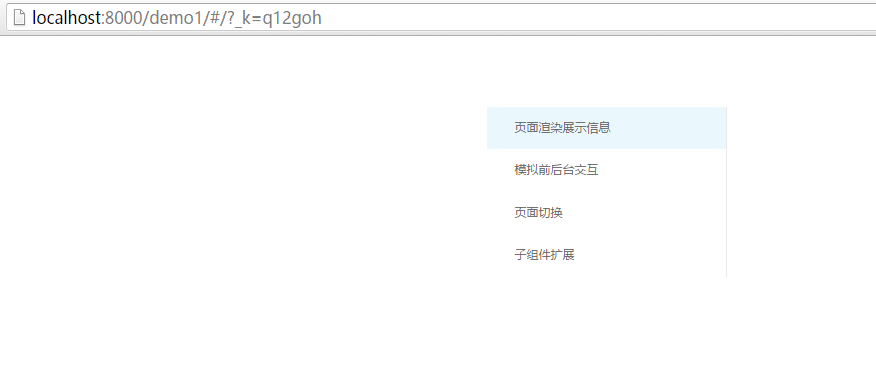
2.单页面渲染,完成数据的展示和隐藏
(1).在component目录下新建ShowSelfMsg.js, 通过改变state状态,重新渲染页面.

import React from 'react'; import {connect} from 'react-redux'; import {Button} from 'antd'; import 'less/common.less'; var mapStateToProps = function(state){ }; class ShowSelfMsg extends React.Component{ constructor(props){ super(props); this.state = { showContent: false }; this.showContent = this.showContent.bind(this); } showContent() { this.setState({ showContent: !this.state.showContent }); } componentDidMount() { const { dispatch} = this.props; //加载该页面的数据 } componentWillReceiveProps(nextProps) { } render() { let showContent = this.state.showContent; return ( <div className='main'> <div className='content'> <Button type="ghost" onClick={this.showContent}>{!this.state.showContent ? '单击显示内容' : '单击隐藏内容'}</Button> { showContent ? (<div><span>大家好,我是hjzgg</span></div>) : (null) } <div className='back'> <Button type="ghost" onClick={()=>this.context.history.pushState({}, '/')}>返回</Button> </div> </div> </div> ); } } ShowSelfMsg.contextTypes = { history: React.PropTypes.object.isRequired, }; module.exports = connect(mapStateToProps)(ShowSelfMsg);
(2).注册路由,在routes/index.js中加入如下代码。
<Route path="/showSelfMsg" component={ShowSelfMsg} />
(3).在Home页面中点击 ‘页面渲染展示信息’,即可进入这个页面。

3.模拟前后台交互
(1).代码编写如下。
(I).在constants新建ActoinTypesjs,定动作类型;
(II).在actions目录中新建simulationRquest.js, 定义要分发的动作;
(III)在reducers目录新建simulationRquest.js,存放reducer函数,用来修改store状态,然后将该函数放入到reducers/index.js中的combineReducers函数中,最终会合并成一个新的reducer;
(IV)components目录中新建FrontAndRearInteractive.js, dispatch 自定义的动作,实现模拟前后台交互功能。
ActionType.js

export const SIMULATION_REQUEST_SUCCESS = 'SIMULATION_REQUEST_SUCCESS'; export const SIMULATION_REQUEST_FAIL = 'SIMULATION_REQUEST_FAIL'; export const INIT_EXTEND_DATA_SUCCESS = 'INIT_EXTEND_DATA_SUCCESS'; export const INIT_EXTEND_DATA_FAIL = 'INIT_EXTEND_DATA_FAIL'; export const SAVE_EXTEND_DATA_SUCCESS = 'SAVE_EXTEND_DATA_SUCCESS';
FrontAndRearInteractive.js

import React from 'react'; import {connect} from 'react-redux'; import {Button} from 'antd'; import {simulationRquestAction} from 'actions/simulationRequest'; var mapStateToProps = function(state){ return { myRequest: state.myRequest, } }; class FrontAndRearInteractive extends React.Component{ constructor(props){ super(props); this.state = { showContent: false }; this.simulationRequest = this.simulationRequest.bind(this); } simulationRequest() { const {dispatch} = this.props; console.log('props>>>dispath:' + dispatch); dispatch(simulationRquestAction()); } componentDidMount() { const { dispatch} = this.props; //加载该页面的数据 } componentWillReceiveProps(nextProps) { const { myRequest } = nextProps; if(myRequest.code && myRequest.msg) alert('请求结果:code=' + myRequest.code + ', msg=' + myRequest.msg); } render() { const { myRequest } = this.props; return ( <div className='main'> <div className='content'> <Button type="ghost" onClick={this.simulationRequest}>模拟请求</Button> { myRequest && myRequest.data ? (<div><span>{myRequest.data}</span></div>) : (null) } <div className='back'> <Button type="ghost" onClick={()=>this.context.history.pushState({}, '/')}>返回</Button> </div> </div> </div> ); } } FrontAndRearInteractive.contextTypes = { history: React.PropTypes.object.isRequired, }; module.exports = connect(mapStateToProps)(FrontAndRearInteractive);
actions/simulationRquest.js

import {ajax} from 'utils/ajax';
import url from 'utils/Url';
import {
SIMULATION_REQUEST_SUCCESS, SIMULATION_REQUEST_FAIL,
} from 'constants/ActionTypes';
function simulationRquestSuccess(data, msg){
return {
type: SIMULATION_REQUEST_SUCCESS,
data,
msg,
}
}
function simulationRquestFail(msg){
return {
type: SIMULATION_REQUEST_FAIL,
msg,
}
}
export function simulationRquestAction(args){
return function (dispatch) {
console.log('actions>>>dispath:' + dispatch);
/*
//真是请求
ajax({
method : 'GET',
url : url.QUERY_ALL_USER,
query : {'args': args},
type : 'json',
success : function(data) {
return dispatch(simulationRquestSuccess(data));
},
error : function(data) {
return dispatch(simulationRquestFail('request fail'));
}
});
*/
//假设请求成功
return dispatch(simulationRquestSuccess('我是后台返回数据:hjzgg!!!', '获取数据成功'));
};
}
reducers/simulationRquest.js

import { SIMULATION_REQUEST_SUCCESS, SIMULATION_REQUEST_FAIL, } from 'constants/ActionTypes'; import assign from 'lodash/assign'; function myRequest(state = { data: null, msg: null, code: null, }, action) { console.log('reducer action属性>>>>>' + JSON.stringify(action)); switch(action.type) { case SIMULATION_REQUEST_SUCCESS: return assign({}, state, { msg: action.msg, data: action.data, code: 'success', }); case SIMULATION_REQUEST_FAIL: return assign({}, state, { msg: action.msg, data: null, code: 'fail', }); default: return state; } } module.exports = myRequest;
(2).路由注册,在routes/index.js增加如下代码。
<Route path="/frontAndRearInteractive" component={FrontAndRearInteractive} />
(3).在Home页面中点击 ‘模拟前后台交互’,即可进入页面。
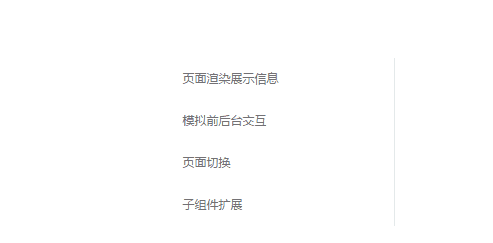
4.页面切换
(1).在components目录新建PageExchange.js 和 Childpage.js,分别为父页面和子页面。注意,这里父页面的变量信息 是通过路由的方式传递过去的,当然也可以通过state方式传递过去。
PageExchange.js

import React from 'react'; import {connect} from 'react-redux'; import {Button} from 'antd'; import 'less/common.less'; var mapStateToProps = function(state){ }; class PageExchange extends React.Component{ constructor(props){ super(props); this.state = { showContent: false }; this.gotoChildPage = this.gotoChildPage.bind(this); } gotoChildPage() { console.log('this.context.history>>>>>>' + JSON.stringify(this.context.history)); this.context.history.pushState({}, 'childDemoPage/' + '我是父页面信息'); } componentDidMount() { const { dispatch} = this.props; //加载该页面的数据 } componentWillReceiveProps(nextProps) { } render() { let showContent = this.state.showContent; return ( <div className='main'> <div className='content'> <Button type="ghost" onClick={this.gotoChildPage}>进入子页面</Button> <div className='back'> <Button type="ghost" onClick={()=>this.context.history.pushState({}, '/')}>返回</Button> </div> </div> </div> ); } } PageExchange.contextTypes = { history: React.PropTypes.object.isRequired, }; module.exports = connect(mapStateToProps)(PageExchange);
Childpage.js

import React from 'react'; import {connect} from 'react-redux'; import {Button} from 'antd'; import 'less/common.less'; var mapStateToProps = function(state){ return { } }; class ChildPage extends React.Component{ constructor(props){ super(props); this.returnParentPage = this.returnParentPage.bind(this); } componentDidMount() { const { dispatch} = this.props; //加载该页面的数据 } componentWillReceiveProps(nextProps) { } returnParentPage() { this.context.history.pushState(null, 'pageExchange'); } render() { const parentPageMsg = this.props.params.parentPageMsg; return ( <div className='main'> <div className='content'> <Button type="ghost" onClick={this.returnParentPage}>返回父页面</Button> { parentPageMsg ? (<div><span>{parentPageMsg}</span></div>) : (null) } </div> </div> ); } } ChildPage.contextTypes = { history: React.PropTypes.object.isRequired, }; module.exports = connect(mapStateToProps)(ChildPage);
(2).注册路由,在routes/index.js中加入如下代码。
<Route path="/pageExchange" component={PageExchange} />
<Route path="/childDemoPage(/:parentPageMsg)" component={ChildPage}/>
(3).在Home页面中点击‘页面切换’,即可进入页面。
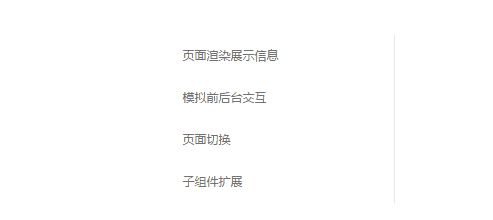
5.自定义扩展组件
(1).先说一下应用场景:多个页面可能需要类似的扩展功能,通过自定义扩展组件,完成对信息的加载。主页面信息保存时,通知扩展组件要保存信息了,扩展组件将最新修改的信息告知主页面,主页面获取到全部信息后,一起将数据传给后台,完成主页面信息和扩展信息的保存。
(2).在components目录下新建Page.js和ExtendPage.js,分别为主页面和自定义扩展组件。
Page.js

import React from 'react'; import {connect} from 'react-redux'; import {Button, Input, Form} from 'antd'; import ExtendPage from 'components/ExtendPage'; import 'less/common.less'; const FormItem = Form.Item; var mapStateToProps = function(state){ return { extendStore: state.extendStore } }; class Page extends React.Component{ constructor(props){ super(props); this.state = { childState: false, } this.handleSubmit = this.handleSubmit.bind(this); this.onSaveExtendPage = this.onSaveExtendPage.bind(this); } componentDidMount() { const { dispatch} = this.props; //加载该页面的数据 } componentWillReceiveProps(nextProps) { } //通知扩展组件,准备保存了 onSaveExtendPage() { if(this.state.childState) { this.setState({ childState: false, }); } } save(values) { //打印父级和子级文本 alert(JSON.stringify(values)); } handleSubmit() { var self = this; this.props.form.validateFields((err, values) => { if (!err) {//表单符合标准 //values 为当前父页面的数据,接下来获取子页面的数据 this.setState({childState: true}, function() { const { extendStore } = self.props; values.extendData = extendStore && extendStore.data || extendStore; self.save(values); }); } }); } render() { const { getFieldProps } = this.props.form; const inputProps = getFieldProps('inputText', { initialValue: '', rules: [ {required: true, message: 'the input is required' }, ], validateTrigger: "onBlur" }); return ( <div style={{marginTop: 50, 600, marginLeft: 'auto', marginRight: 'auto'}}> <Form onSubmit={this.handleSubmit}> <FormItem {...{labelCol: { span: 6 }, wrapperCol: { span: 14 }}} label="父级文本: "> <Input {...inputProps} id='inputText' type='text'/> </FormItem> <FormItem wrapperCol={{ span: 12, offset: 6 }}> <Button type="primary" htmlType="submit">提交</Button> </FormItem> </Form> <ExtendPage childState={this.state.childState} callBack={this.onSaveExtendPage} /> <div style={{float: 'right'}}> <Button type="ghost" onClick={()=>this.context.history.pushState({}, '/')}>返回</Button> </div> </div> ); } } Page.contextTypes = { history: React.PropTypes.object.isRequired, }; Page = Form.create()(Page); module.exports = connect(mapStateToProps)(Page);
ExtendPage.js

import React from 'react'; import {connect} from 'react-redux'; import {Button, Form, Input, message} from 'antd'; const FormItem = Form.Item; import {initExtendData, saveExtendDataAction} from 'actions/extendPage'; var mapStateToProps = function(state){ return { extendStore: state.extendStore } }; class ExtendPage extends React.Component{ constructor(props){ super(props); this.state = { } this.saveExtendData = this.saveExtendData.bind(this); this.checkText = this.checkText.bind(this); } checkText(rule, value, callBack) { if(/s+/.test(value)) { callBack("不能有空白字符"); } else { callBack(); } } saveExtendData() { this.props.callBack();//保存成功后,更改父页面的childState的状态 this.props.form.validateFields((err, values) => { if (!err) {//表单符合标准 console.log('save ExtendPage values: ' + JSON.stringify(values)); const {dispatch} = this.props; dispatch(saveExtendDataAction(values)); } }); } componentDidMount() { const { dispatch} = this.props; //初始化扩展页的数据 dispatch(initExtendData()); } componentWillReceiveProps(nextProps) { const { extendStore, childState } = nextProps; if(extendStore && extendStore.msg) { message.info(extendStore.msg, 5); extendStore.msg = null; } if(childState) {//父页面 改变 子页面的状态 this.saveExtendData(); } } render() { const { getFieldProps } = this.props.form; const { extendStore } = this.props; const inputValue = extendStore && extendStore.data && extendStore.data.extendInputText || null; const inputProps = getFieldProps('extendInputText', { initialValue: inputValue, rules: [ {required: true, message: 'the input is required' }, {validator: this.checkText} ], validateTrigger: "onBlur" }); return ( <div> <Form> <FormItem {...{labelCol: { span: 6 }, wrapperCol: { span: 14 }}} label="扩展本文: "> <Input {...inputProps} type="text" id="extendInputText"/> </FormItem> </Form> </div> ); } } ExtendPage = Form.create()(ExtendPage); module.exports = connect(mapStateToProps)(ExtendPage);
(3).说一下组件的扩展机制
(I).扩展组件自身会维护更新自己state状态,在触发扩展组件保存时,扩展组件将自身数据通过dispatch进行分发,最后通过对应的reducer(这个reducer会通过combineReducers函数合并成一个新的reducer)进行处理,根据逻辑生成新的state。
>>定义动作类型
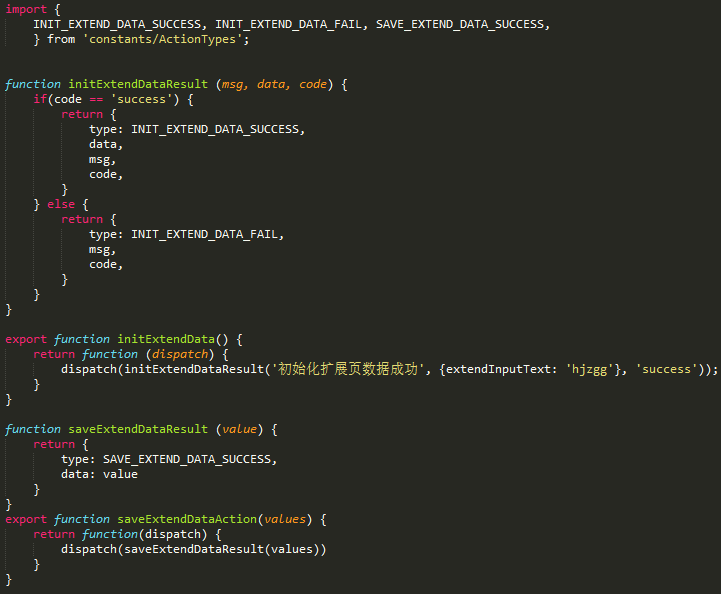
>>分发动作

>>reducer处理动作,返回新的state
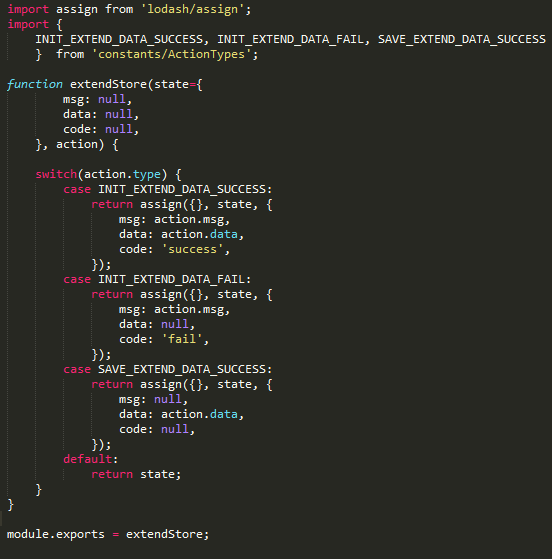
>>自定义的reducer函数通过combineReducers函数进行合并
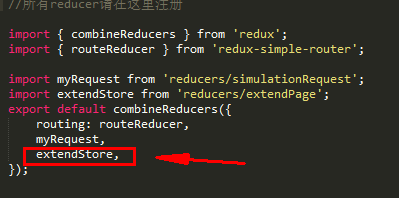
(II).父级组件如何获取扩展组件的状态?

也就是store中的状态树变化的时候,组件可以通过 mapStateToProps 函数从状态树中获取最新的state。
(III).父级组件如何通知扩展组件 准备保存数据了?

>>扩展组件接收父级组件两个参数:childState, 通知扩展组件状态发生变化; callBack, 修改childState状态,扩张组件通知父级组件更新完成。
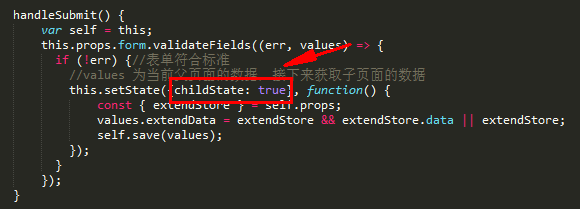
>>父级组件保存数据时,首先获取到自己的数据,然后通过setState()方法改变childState的值,通知扩展组件。最后通过setState方法传入的回调函数(该函数在组件更新完成之后调用)获取到扩展组件的最新state。

>>扩展组件接收到父级组件的通知,刷新store中的state。这样父级组件和扩展组件自身都可以通过mapStateToProps方法获取到最新的state。
(4).注册路由,在routes/index.js中加入如下代码。

(5).在Home页面中点击‘页面切换’,即可进入页面。

五、问题解惑
1.module.filename、__filename、__dirname、process.cwd(): http://www.tuicool.com/articles/bQre2a
2.node.js之path模块: http://www.jianshu.com/p/fe41ee02efc8
3.react-router: http://www.ruanyifeng.com/blog/2016/05/react_router.html?utm_source=tool.lu
4.出现如下错误:Cannot sync router: route state does not exist. Did you install the routing reducer,参考:
5.module.exprots, export, export default区别:
export default variation import variation from 'js file' export variation import {variation} from 'js file' module.exports=variation import variation from 'js file'
参考:
http://www.2cto.com/kf/201412/360211.html
http://www.jb51.net/article/33269.htm
http://blog.csdn.net/zhou_xiao_cheng/article/details/52759632
http://blog.csdn.net/zhou_xiao_cheng/article/details/52759632
